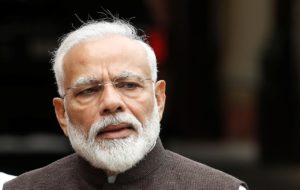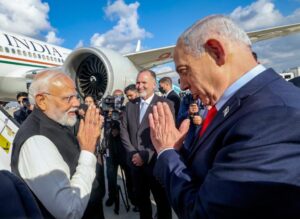India’s EVMs Have A Trust Problem

There are fears about the fairness and openness of India’s voting system, with the previous unwavering faith in the country’s EVMs now in doubt. The Indian Supreme Court will soon hear a plea seeking cross-verification of votes cast in EVMs with Voter Verifiable Paper Audit Trail (VVPAT)
Criticism of EVMs is legitimate, but it shouldn’t overwhelm the devices’ potential to strengthen democracy. Electronic voting machines are coming under the spotlight as India organizes its general election.
There are fears about the fairness and openness of India’s voting system, with the previous unwavering faith in the country’s EVMs now in doubt.
The Indian Supreme Court will soon hear a plea seeking cross-verification of votes cast in EVMs with Voter Verifiable Paper Audit Trail (VVPAT).
The potential for voting machine hacking has cast a shadow over India’s democratic landscape. There is apprehension in some quarters that the devices can be manipulated.
The Opposition has directly alleged that Prime Minister Narendra Modi relies on EVM hacking to win elections. At a recent rally in Mumbai, Rahul Gandhi, the leader of India’s largest opposition party, asserted: “The king’s (Modi’s) soul is in the EVM”.
Electoral processes have evolved significantly over time. Initially, voters used traditional ballot papers, manually writing candidates’ names and depositing them in designated boxes.
As India’s population grew and concerns about electoral fraud associated with ballot papers escalated, the People’s Representation Act was amended in 1989 to enable EVMs to prevent electoral fraud. In 1998, EVMs made their debut during legislative assembly elections. Their first use at a general election was in 2004.
This transition to voting machines underscores the nation’s commitment to modernising its electoral infrastructure, ensuring efficiency, transparency and integrity of the polling process.
In 2017, the Delhi Assembly convened a special session, where Saurabh Bharadwaj, an Aam Aadmi Party (AAP) legislator, demonstrated with a dummy EVM how easily it could be hacked.
Bharadwaj claimed that a “manipulator” could enter the polling booth during voting and input a unique secret code, resulting in subsequent votes being directed to a particular candidate.
He also claimed an EVM’s motherboard could be changed in just 90 seconds. AAP later posted the results of this demonstration on its Twitter page, showing the Bharatiya Janata Party (BJP) receiving more votes than it actually obtained in the final results.
As the majority party in the Delhi Assembly and now governing Punjab, AAP’s vocal stance against voting machine integrity has implications for the trust of India’s 969 million voters in the election process.
The scepticism surrounding voting machines has intensified, with opposition parties including AAP and INC voicing concerns about potential bias favoring the ruling party.
Recent state elections in Rajasthan, Telangana, Chhattisgarh and Madhya Pradesh showed discrepancies between election results and exit polls leading to vehement protests.
An incident during the Bihar elections further eroded trust. The manipulation of EVMs left citizens questioning the legitimacy of results. The Election Commission of India (ECI) attempted to address these concerns but widespread scepticism remained.
A critical revelation emerged from a Right to Information (RTI) request: EVMs do not have software permanently burnt into one-time programmable (OTP) chips, as previously claimed by the ECI. Instead, they use chips that can be reprogrammed.
While hacking EVMs would still require physical access to the machines used in elections, this revelation has fuelled mistrust among voters.
The apprehensions harboured by the general populace regarding the integrity of voting machines have transcended the concerns of political parties to encompass civil society at large.
In a noteworthy demonstration of dissent, numerous individuals, including Ambedkarite advocates, legal professionals, and other members of civil society convened at Delhi’s Jantar Mantar on February 2, 2024 demanding the prohibition of EVMs.
Advocates of this stance have persistently voiced their reservations regarding EVMs across various regions of India, notably through the #EVM_ban campaign in anticipation of the forthcoming 2024 general elections. Thousands of tweets were made under this hashtag from across the country.
Some people even tweeted that they would stay away from the election process if EVMs are not replaced. The objections regarding EVMs is not a recent development. Intriguingly, its origins go back to the 1980s, predating their actual deployment in elections.
The seminal legal case of AC Jose vs. Sivan Pillai represents an early instance, wherein a petition was filed seeking a stay order on the utilisation of EVMs for an impending bi-election in Kerala.
The SC ruled in the favour of the petitioner and ordered a repoll in the 50 booths using paper ballots. As a result, Jose defeated Pillai, the winner in the first vote, with a margin of around 2000 votes.
During the 1990s, Election Commissioner T.N. Seshan recognised the urgency of addressing ballot frauds. He championed the development of EVMs as a potential solution. While political parties have raised concerns, no concrete evidence has been presented to prove EVM manipulation. Nevertheless, the issue persists.
As India prepares for the 2024 general elections, addressing EVM-related apprehensions remains critical.
In order to save the democratic ethos of India, EVM hacking must be addressed. Enhancing accountability and transparency in EVM deployment and procurement processes can boost voter confidence.
Robust oversight procedures, such as impartial audits and exacting testing procedures can be employed. Additionally, procuring advanced EVM technology with enhanced security features, such as end-to-end verifiable systems and paper audit trails, can strengthen the integrity of electoral outcomes.
Raising public awareness and engagement through comprehensive civic education initiatives can empower citizens to actively participate in safeguarding the electoral process. This will boost the confidence of a common voter in the electoral process.
Instead of completely rejecting the use of EVMs, efforts must concentrate on utilising technical innovations to uphold democratic principles (and ensure due process in the machine’s use).
It is vital that everyone – the ruling parties, opposition parties, civil society organizations, voters, democratic institutions, and technology centres – are brought together in this democratic exercise to take joint action in securing the sanctity of the world’s largest and most expansive electoral process.
(Originally published under Creative Commons by 360info™)





